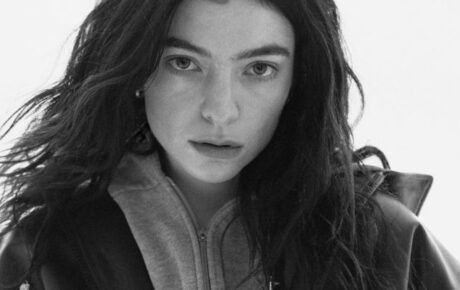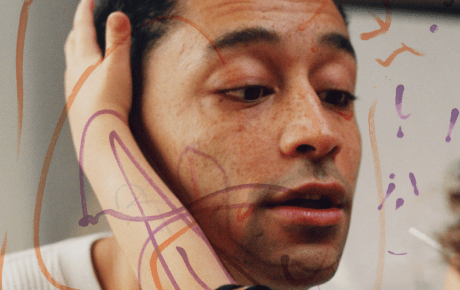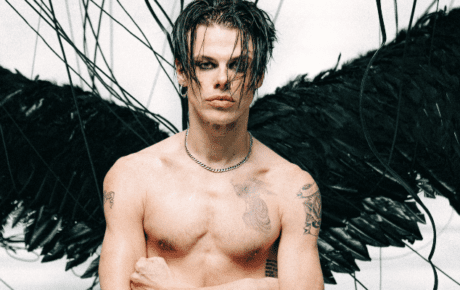Fellow guests, please be seated – the official meeting of The Tortured Poets Department is here, and haven’t we waited a long time to convene? Take your seats, and let us begin our extensive agenda.
Since announcing TTPD at this year’s Grammys, theories have been flying and excitement has been soaring around the internet’s corners. In what is possibly her most personal album to date, Chairman Swift has been on a mission – of both quality and longevity. Which will be your favourite form today – originals or The Anthology? Either way, we are here to help you decide.
Opening Tortured Poets Department is ‘Fortnight’ and along with it, our first guest lecturer to the Department. The video for this song is possibly one of Taylor’s most thought-out yet – from the silhouette matching 2014’s ‘Style’ music video to the inclusion of Ethan Hawke and Josh Charles from the iconic film ‘Dead Poets Society’, the lack of a ‘1’ on the typewriter keyboard (definitely a folklore reference), the running of the black dog across the screen and SO much more. The Easter eggs in these baskets are overflowing. The song encapsulates the image of a short-lived, forbidden affair. Post Malone’s signature laconic vocals add an extra dimension to the track, making it even more gutting to listen to. The end of the song gives listeners the first location reference. This one will become potent throughout the album’s continuance as the narrator escapes to Florida.
Who would understand a doomed, fast-paced experience better than two poetic artists? It all feels very The 1975-coded here, from the tattoos to the typewriters to the line about chocolate, the last of which is the most obvious. A standout lyric is ‘You’re not Dylan Thomas / I’m not Patti Smith / This ain’t the Chelsea hotel.’ Swift has chosen to name many an individual throughout TTPD, and in the titular track, we get two of these examples: other celebrities, and people Taylor personally knows. Jack Antonoff and Lucy Dacus of boygenius get mentions, but Patti and Dylan’s are far more interesting. Swift seems to put the characters in the song up on a pedestal but doesn’t seem to feel as if they are on the same level, indicating that they should be taking their lives less seriously.
‘My Boy Only Breaks His Favourite Toys’ is shattering in its symbolic significance. Dolls, playhouses, Ken (paralleling the Ken reference in ‘Hits Different’), sandcastles, and others. Swift really plays on the theme of isolation here, and the feeling of being discarded when you’re past your point of usefulness. It’s something many people have experienced at some point in their lives, and that’s what makes this song so evocative.
We next get a progression with ‘Down Bad.’ It’s almost manic, especially in the line about ‘teenage petulance.’ The importance of the relationship being spoken about is harshly highlighted in the chorus, when she calls the person ‘my twin’, following it up with ‘f**k it if I can’t have him.’ However, by the song’s conclusion, it’s shifted to ‘f**k it if I can’t have us’ and past tense instead of present, saying she WAS in love. The toxicity of love bombing is also acknowledged, as Swift called this type of relationship equivalent to being ‘abducted by aliens’ in an interview. It’s further emphasised with a nod to 1989’s ‘New Romantics.’ Here it’s noted that being stranded doesn’t feel how she previously thought it might, punctuating it with a ‘how dare you’ – this is no longer an appealing concept to a more developed Taylor.
‘So Long, London’ is the heartbroken sequel to Lover’s ‘London Boy.’ Against its slow, contemplative instrumentals, it’s clear that with TTPD’s release, this album will be the last we hear about London.
In what is possibly the most scandalous, exciting song in the first half, ‘But Daddy I Love Him’ comes across as a dig at her critics, including those within her fanbase. The pearl-clutching that seemed to transpire upon the commencement of dating Matty Healy once again is the backbone of this story. With its stadium-sized defiance and subtle country musicianship at the song’s end, Swift once again proves a point: she criticizes her audience, yet gets them to worship the music that does that. I might be the only one who thought of this comparison, but one of my favourite films of all time is 10 Things I Hate About You – and… is this song Bianca Stratford coded? Please tell me I’m not crazy here!
She follows it up with ‘Fresh out the Slammer.’ Using her signature ability to weave analogies seamlessly into her music, Swift uses many a reference to a trapped relationship in this song, including of course the title but also ‘handcuffed’, ‘doing her time’, ‘locks’ and ‘ceilings.’ Swift has been very open about the fact that she locked herself away after the situation with Kanye and Kim, and seems to be pulling on that experience to create this heavily symbolic track.
‘Florida!!!’ is definitely in contention with ‘Fortnight’ for the most intense collaboration on TTPD. Florence Welch showcases her ability to nail complex vocal runs in her verse and throughout, adding to the song indeed being ‘one hell of a drug.’ While Swift’s voice has been with many others over the years, it’s safe to say this pair nailed it. With its suspense throughout, ‘Florida!!!’s chorus explodes like a series of exclamation marks, using highly pointed instrumentals to illustrate this. Wrapping the holiday destination of Destin into a hurricane-sized parcel makes the song both deeply passionate and deeply eerie.
‘Guilty As Sin?’ and ‘Who’s Afraid of Little Old Me?’ are a perfect back-to-pack pairing. They’re both almost mocking in their questioning, as Swift addresses the rumours that swirl around her existence in each of them. In both, Swift emphasises she is the only one who knows what truly goes on, but that others should feel threatened by her power. Each is confrontational in ways that are somehow the same, yet different. ‘Who’s Afraid of Little Old Me’ in particular calls back to songs like ‘the last great American Dynasty’ and ‘mad woman’ from folklore, and Lover’s ‘MAATHP.’
View this post on Instagram
Travis Kelce gets his moment – more than once, and we love that for him. In ‘So High School’, Taylor references a video that went around a while ago, of Kelce playing ‘Kiss Marry Kill’ (way before they were dating). Singing ‘nobody’s ever had me / not like you’ clearly Swift hopes this relationship will be different. But the most obvious Kelce references come on ‘Alchemy’, which is stuffed to the brim with references to the NFL and all that comes with it. A kaleidoscope of allusions to benchwarmers, touchdowns and trophies undoubtedly makes it one of the album’s most optimistic. Swift essentially made history in 2023 with her spectacular debut to the world of American football, and various entities have been lapping it up since, alongside the Swift-Kelce love story itself.
‘loml’ is quiet, downgraded and echoes a sentimental sorrow. The term ‘LOML’ typically stands for ‘love of my life’ however here, in its abbreviated glory, it’s ‘loss of my life.’
In one of the more heartwrenching moments of the first half, Taylor sings about what appears to be her mental health during the Eras tour, saying she was always crying but so productive on ‘I Can Do It With A Broken Heart.’ In what has undoubtedly been one of the busiest, most chaotic years of her career, it’s not surprising that Swift may have been struggling in private throughout it all. From the tour to the film about the tour to obviously creating this in secret, to her most public relationship debut yet – it’s been a lot! Sonically, the instrumentals don’t match the lyrics in this one – but that somehow makes it even more eerie with its overexcited tones. The lyrics also may link to the earlier track ‘Down Bad’ when Swift says she has been ‘crying in the gym’ as she’s spoken in interviews about how intense Eras training was.
‘The Smallest Man Who Ever Lived’ is undeniably brutal – and packed with Easter eggs alluding to Midnights. With the person in question throwing rust on Swift’s ‘sparkling summer’ (a potential reference to the ‘Bejeweled’ feeling she was searching for during last summer), it’s clear there’s a lot of love lost in this one. Maybe it’s the most cutting track of the whole lot. My ego is cut and it’s not even about me.
‘Clara Bow’ brings listeners back to the self-referential. There’s no doubt that Taylor is currently one of the world’s most famous women, and here Taylor groups herself with other defining women of different eras, including Clara and Stevie Nicks. By placing herself next to these legendary figures, Swift indicates acceptance towards the era-defining fame she’ll likely experience for the rest of her life.
The Tortured Poets Department – Anthology is somehow a mix of the better aspects behind Taylor’s previous discography. With Jack Antonoff producing the first half of the album and Aaron Dessner chiming in on the second, TTPD sonically sounds like two halves – one Midnights inspired and one more of a round-up to the evermore / folkmore universe. The two sections are differing sections of the same statement.
View this post on Instagram
The opening bookend for The Anthology is the slow, tantalising, torturing ‘The Black Dog.’ While not as obvious as in ‘So Long, London’, the references are still there in this half, albeit less directly. The Black Dog is a London pub, near where Swift and Alwyn supposedly cohabited during their relationship. In English myths, they’re also supernatural hellhounds, so that’s something. The whimpering echoes of the last notes and its overall depressive tone emphasize the feelings accompanying saying goodbye to a relationship.
The above song is the first of the bonuses fans could receive, along with 3 other potential tracks. All of those tracks feature on The Anthology, ensuring nobody misses out.
‘Imgonnagetyouback’ is full of smooth synths with a multi-layered chorus. It’s home to many harmonies that speak to the enchanting, mystifying message behind its creation. Swift presents a variety of options, from ‘pulling them into the closet’ to ‘smashing up their bike’ or becoming their wife. The wordplay is very similar to that of Olivia Rodrigo’s ‘Get You Back’ (2023), which sampled Fiona Apple’s 2005 song, ‘Get Him Back.’ The song by Apple uses a familiar motif present during TTPD’s evolution: I love you, but it’s ruining my life – as first heard in ‘Fortnight.’
‘The Albatross’ once again seems to be a cleverly designed reference to her relationship with Alwyn, which spanned six years. The large black and white seabird not only features the same colours as both Swift’s 2024 Grammys dress (where she announced TTPD) and the album art but is a bird that spends the first six years of its life without ever touching land. It’s not too much of a stretch to imagine that this exact comparison was Swift’s intention, which showcases her adept thinking regarding her lyric choices yet again.
There’s many Easter eggs throughout TTPD, and ‘Chloe or Sam or Sophia or Marcus’ is no exception. Swift once again calls out her previous work in this track with a lyric that talks about ‘the scarlet maroon.’ No doubt eagle-eared listeners picked this one up on the first go, and it’s not the only crystal clear Midnights allusion in the second half. It’s not the strongest of the set, but it’s still a lovely track.
In a highly relatable moment, Swift uses ‘I Hate It Here’ to discuss how she sometimes needs to disassociate to handle difficult situations. While the visuals evoked are powerful (‘I will go to lunar valleys in my mind / where they found a better planet, only the gentle survived’), it’s also the song where she muses she’d like to live in the 1830s, but ‘without all the racists.’ Possibly not the most tasteful lyric on the album?
In the second half, there’s a trio of tracks where Swift names the songs and uses the themes to bind the idea of various characters, although ones who exist in different universes.
‘The Prophecy’ and ‘Cassandra’ go hand in hand regarding their titles, but they are worlds apart. Swift uses this single to, in a way, emphasize the potential consequences of fame – she has all the money she could want, but not the luck of being around people who truly ‘want her company.’ Full of allusions to folklore’s tracks ‘invisible string’ and ‘Willow’ it’s home to possibly one of the most clever bridges in the album. Describing herself as a ‘wolf howling at the moon’ and ‘coven round a sorcerer’s table.’
She first powerfully calls on the idea of the Greek mythology figure ‘Cassandra’ in track 27, whose story is one of a mythological prophetess telling the future – but not a single soul believes her predictions. Swift uses the symbolism of snakes again here, and the song pairs nicely with the serpentine aesthetic that’s been on her mind since Reputation.
It seems ‘Cassandra’ is a suitable sequel to ‘thanK you aIMee’, an earlier, snark-style song in which Swift capitalises the title’s letters to spell out ‘Kim Kardashian.’ Although many years have passed since the feud’s ignition, the experience appears to provide adept lyric material.
Second in the trio is ‘Peter.’ A callback to folklore comes swiftly, as in ‘Cardigan’ she sings about Peter Pan ‘losing Wendy.’ With the creation of this new track, Peter has indeed, well and truly lost her. She conjures memories of a faraway childhood and the ‘lost boys’ chapter of her life, before pleading ‘forgive me, Peter, please know that I tried.’ It’s haunting, devastating and a little nostalgic.
Lastly, ‘Robin’, calls upon a similar world to ‘Peter’ with its vivid portrait of youth using whimsical lyrics and a more gentle melody than much of the album, Swift encourages the subject to preserve the wildness of childhood through the mentions of things like ‘dragonflies’ and ‘swing sets.’ while the title isn’t explicitly referenced in the lyrics, it may be about the character of Robin Hood, with its lines of heroism, but also could be about Aaron Dessner’s childhood friend of the same name. One thing is for sure though – and that is that it’s one of the more innocent, universally relatable pieces here. Thematically, it’s also got points of similarity to Speak Now’s ‘Never Grow Up.’ Always an emotional one.
TTPD has felt in a way almost like history even as it’s just been announced. With Taylor firmly showing snippets of life on social media that seem to indicate the era is already a closed door, ‘The Manuscript’ echoes this sentiment. Swift closes this album (her longest yet), with this piano-laden track, the last lyrics being ‘but the story isn’t mine anymore.’ With the release of TTPD into the world, the chapter has closed. And what a haunting, beautiful chapter this one has been – thank you, Taylor.












